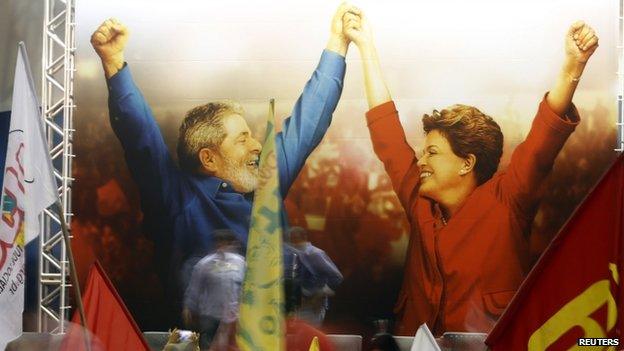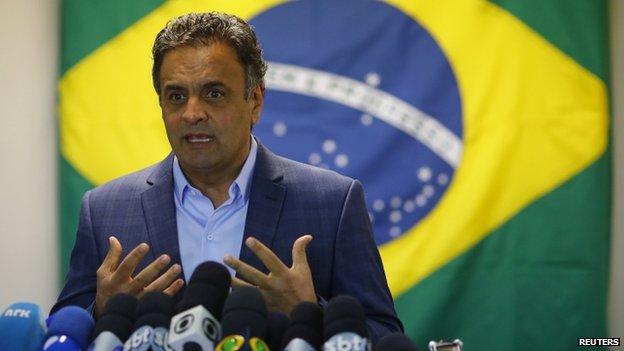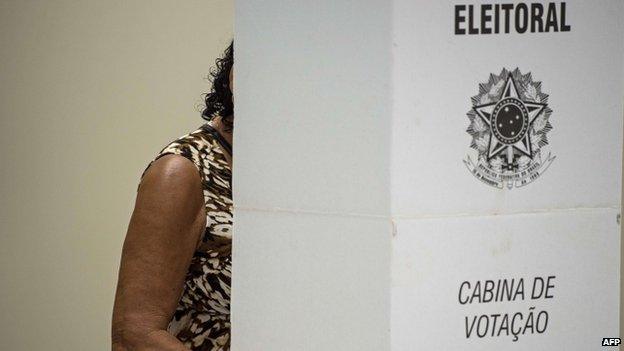Brazil elections: Damned lies and opinion polls
- Published

Ms Rousseff (right) is not seen by many in Brazil as charismatic as her predecessor and mentor "Lula"
Lies, damned lies and opinion polls.
I have decided, in the two weeks or so that remain in Brazil's presidential election run-off campaign, to ignore the plethora of opinion polls that will undoubtedly emerge before polling day.
Not only were many of the polls released before the first round inaccurate and misleading but they also detracted from the campaign itself and the issues.
Brazilian broadcasters seemed to get mesmerised more by graphs and stats than by what the candidates were saying.
There is, of course, only one poll that matters.
This is still Dilma Rousseff's election to lose. As the incumbent president and the "winner" of the first round (by almost 9 percentage points) she has a considerable advantage over her opponent, Aecio Neves of the Social Democratic Party (PSDB).
'Informal pact'
However, unlike in 2010, there are also a number of factors acting against Ms Rousseff and her PT (Workers' Party) now. Her advantage over Mr Neves is much smaller than the margin she enjoyed when challenging the then PSDB candidate, Jose Serra, for the presidency four years ago.

Mr Neves' opponents portray him as the privileged son of a Brazilian political dynasty
Now, many (but not all) of those against whom she fought in the first round have thrown their weight behind Mr Neves. The most significant of these, thus far, is the Socialist Party (PSB) of the former candidate, Eduardo Campos.
Mr Campos was killed in an August plane crash and replaced by Marina Silva - but it had long been suggested that Mr Campos and Mr Neves had an informal pact for one to support the other in the event of a run-off.
The "Socialists" backing for the business-focused centrist Mr Neves, rather than the distinctly ideological leftist PT of Ms Rousseff is also proof that party names and tags in Brazil should be taken at face value.
As one commentator said on social media this week, Brazil is a country where most parties say they're left-of-centre but in reality many are quite the opposite.
Rapprochement unlikely
Marina Silva does not belong to the PSB - so everyone is now waiting to see who the woman who pulled in 21% of the vote in the first round will support in the second.

There's a growing feeling that many in Brazil want change
Ms Silva and Ms Rousseff are former ministerial colleagues and, in principle, ideologically close.
However, they had strong policy disagreements even when both were members of the PT. The incumbent's attacks on Ms Silva's policies and character in the first round also make a rapprochement between the two highly unlikely.
The best President Rousseff can hope for is that, as she did when in a similar position in 2010, Ms Silva will resolutely refuse to endorse anyone.
All the mood music, though, suggests that Ms Silva is ready to throw her lot in with Mr Neves. The former environmental champion will, however, want specific assurances on workers' rights, the power of agro-businesses and deforestation in return for her support.
And that is why, despite being well up on points after the first round, Dilma Rousseff's team should be a little bit concerned. There's a growing feeling that many in Brazil want change.
Clear choice
There's widespread support, especially in poorer areas, for the PT's social welfare programmes that have helped to elevate tens of millions of Brazilians out of poverty.
Similarly, the economy is in a far better position than it was when Brazil threw off the shackles of military rule in the 1980s.
But the PT has now been in power for 12 years. Ms Rousseff is not as charismatic or as popular as her predecessor and mentor, President "Lula", and she might find herself being voted out of power without having done anything particularly wrong.
Mr Neves, and the loose coalition of support he's putting together before the run-off on 26 October, says otherwise.
The economy has undoubtedly slowed down in recent months and is now, technically, in recession.
The high cost of living, concerns about job security and rising violence in the big cities are all factors the opposition plays on.
Brazilians face a pretty clear choice. Mr Neves and Ms Rousseff are very different people with a different emphasis on how to lead the country and the next two weeks are likely to see spirited exchanges.
PT supporters will portray Mr Neves as the privileged son of a Brazilian political dynasty.
Ms Rousseff, say her detractors, is an authoritarian technocrat with an old fashioned state-controlled approach to growth.
The political map of Brazil now looks increasingly divided - the poorer northern regions, where people have benefited from the PT's welfare programmes are very much pro-Rousseff.
Mr Neves, on the other hand, is showing well in the industrial south, where his policies are regarded as more pro-business.
Unlike the winner-takes-all system in the American states, every vote counts in Brazil towards the final total, so the two candidates will be crisscrossing this massive country in the coming weeks... and hopefully not reading too much into the opinion polls.
- Published3 October 2014

- Published28 September 2014
- Published20 August 2014
- Published4 June 2014
- Published27 August 2014